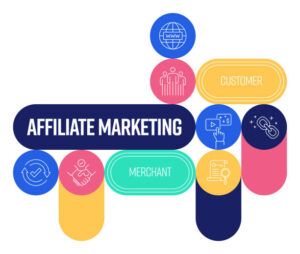Affiliate marketing, pretty much a buzzy term these days, is essentially a type of performance-based marketing where a business rewards affiliates for each customer brought by their own marketing efforts. Ever wondered who came up with this? Well, while it feels like something brand new, it all began back in the mid-1990s as a clever way to generate revenue with the nascent World Wide Web.
The meat and potatoes of affiliate marketing is pretty straightforward. You’ve got the merchant, or brand, selling something; the affiliate, who promotes that something through various means; and the consumer, who buys that awesome thing. Affiliates use links, banners, and other tools to drive traffic to the merchant’s site, earning a commission for every sale or action completed through their link.
Dive into different kinds of affiliate marketing channels and you’ll quickly realize there’s more than one way to play this game. Content sites, email marketing, and influencer partnerships are just the tip of the iceberg. Each channel brings a unique flavor and audience engagement, making them indispensable in different scenarios.
Pinning affiliate marketing against other strategies like PPC or SEO shows some stark differences. Unlike pay-per-click advertising, where you’re shelling out cash upfront, you only pay affiliates when they bring in results. That’s a game-changer for smaller businesses looking to scale without upfront costs.
The Benefits and Challenges of Affiliate Marketing

Affiliate marketing isn’t just another brick in the marketing wall; it’s a powerhouse of advantages for businesses trying to stretch their buck. Brands can tap into new audiences without diving headfirst into massive advertising costs. Imagine paying only when you see the results—sounds pretty ideal, right? It’s like having an army of marketers working around the clock, pushing your products to an audience they already know and trust.
On the flip side, from the affiliate’s point of view, there’s a sweet deal too. Affiliates enjoy the freedom to select products they believe in, presenting them in a way that feels true to their style. It’s a potential goldmine, where earnings aren’t capped by a pesky hourly rate, but determined by creativity and reach.
Challenges, though, are part of the package. With the popularity of affiliate marketing climbing through the roof, competition can get fierce. When everyone’s in the game, standing out becomes quite the challenge. But spotting the niche, understanding what people actually need, and meeting that demand can give you the edge.
Then there’s this thing about ethics. Building trust with your audience is crucial because people can smell a hard sales pitch from a mile away. Authenticity matters, and getting this right means keeping the business-professional reputation intact while giving your audience something worth their time and money.
Building a Successful Affiliate Marketing Strategy
Crafting a killer affiliate marketing strategy hinges on picking the right network to partner with. Not all networks are created equal, and one size definitely doesn’t fit all. This means doing your homework to find one that aligns with your brand’s ethos and reaches the right audience.
Next up is knowing who you’re talking to. Sounds simple, but defining your target audience means you can laser-focus your efforts on the people most likely to convert. It’s about matching the right products with the right people, ensuring what you’re promoting hits home for them.
Content is king, or so they say, but in affiliate marketing, it’s the jewel in the crown. Affiliates need to whip up engaging, genuine content that subtly sells. It’s all about storytelling—creating a relatable narrative that incorporates the product as the unsung hero of everyday life.
And let’s not forget about analytics. Data is your best friend when it comes to tracking performance. Being able to tweak campaigns based on what’s working and what’s not is where you separate the novices from the pros. It’s about refining and optimizing, ensuring every move brings you closer to YOUR goals.
The Future of Affiliate Marketing: Trends and Innovations
Peeking into the future, affiliate marketing is set to evolve with the relentless march of technology. With artificial intelligence and data analytics leading the charge, the way affiliates operate is bound to change. There’s a whole world of insights AI can offer to perfect targeting and refine strategies like never before.
The days of one-size-fits-all marketing are fading fast. Consumers now crave personalized experiences, and that’s shaping how affiliates go about their craft. Tailoring content and offers to individual preferences is more than just a trend; it’s becoming a cornerstone of affiliate strategies.
Influencers are shaping up as the new-age affiliates, bringing their own quirks and personalities to marketing campaigns. While that opens up tons of opportunities, picking the right influencer is key—it’s a double-edged sword that requires careful handling to avoid pitfalls.
Sustainability and ethics aren’t just buzzwords—they’re shaping consumer choices more and more. Aligning with ethical and sustainable practices is not just good karma but good business in a world that’s increasingly conscious about the origins and impact of what they buy.


This article provides such a well-rounded view of affiliate marketing! It’s exciting to see the potential of performance-based marketing, especially for smaller businesses aiming to grow without heavy upfront costs. I’m curious about the role of AI and personalization in affiliate marketing—could you share more about how AI-driven insights could refine targeting? Also, with influencer marketing on the rise, how do you suggest finding the right influencers to maintain authenticity and avoid appearing too “salesy”? This balance between effective marketing and building trust with audiences seems crucial in such a competitive space. Thanks for the insights!
Thanks.